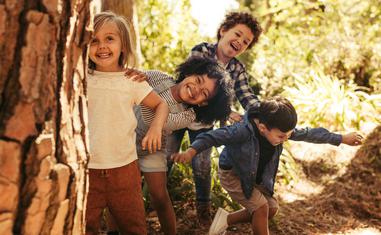The views expressed in our content reflect individual perspectives and do not represent the authoritative views of the Baha'i Faith.
Multiple polls show that the number of happy adults in modern society has dwindled. This is due to so many things – but here, let’s focus on why children are so happy, and what we can learn from them.
Just one stunning statistic reveals the basic issue: research shows that children smile an average of 400 times per day, compared to the average happy adult who smiles 40-50 times per day, and the typical adult who smiles only 20 times per day.
That’s a 20 to 1 ratio.
RELATED: Nature Feeds the Human Spirit
Perhaps, several recent studies have concluded, we can gauge our level of happiness by how much time we spend in nature. Typically, children who spend more time outside become happier adults.
The Baha’i teachings recognize that immersion in nature has a positive effect on all of us, especially when it leads to a recognition of the relationship between the Creator and creation. In its 1995 report on Conservation and Sustainable Development, the Baha’i International Community stated: “The Baha’i world will work ceaselessly to develop in all its members – children, youth and adults – a deep respect for nature as a reflection of the majesty of the Divine.”
We have so much to learn from the natural world – and children learn those lessons naturally when they spend time there.
So maybe children are happier than adults because they aren’t clouded with judgment and prejudice. Prejudice is something that we learn, and not something inborn. People aren’t born racist, they are taught it by society. Children naturally act loving towards all, no matter what. They don’t care about what walks of life someone comes from, their cultural background, religion, class, etc. Children are so much happier because their brains aren’t polluted with so much judgment and hate for others – and because they learn from nature the beauty of co-existence and cooperation.
Children also tend to make decisions that aren’t clouded by negative influences. We get those negative influences through other people, the media, and our interactions with society. Children are often disconnected from those influences, and more connected with learning about and interacting with the natural world. Of course, the inborn curiosity all children have doesn’t mean that children always make good decisions, as every parent on the planet can corroborate. A child may touch a hot stove or run across a street with a car coming, but they usually act with pure intentions.
Also, kids aren’t afraid to express themselves through creativity. So many young children like to paint and draw, for example. They’re natural artists, inspired by the natural world. But we see that number dwindling as they get older and hear from society that the arts aren’t sustainable careers. Instead, children express their love for nature and this beautiful planet that God bestowed upon us.
RELATED: Nature and Nurture: Surfing As a Spiritual Practice
Ultimately, the root of all unhappiness is spiritual. As we grow older we become so attached to our material existence, and instead of enjoying the life we were given, we spend each fleeting moment waiting for the next. Children are still developing and have yet to be faced with the many challenges of the material realm, but children just simply live in the present, able to enjoy those small special moments.
In a speech he gave in the United States in 1912, Abdu’l-Baha commented on the purity and innocence of children, encouraging adults to find those qualities in their own lives:
Men must become pure in heart to know God. The teachings have had great effect. Spiritual souls! Tender souls! The hearts of all children are of the utmost purity. They are mirrors upon which no dust has fallen. But this purity is on account of weakness and innocence, not on account of any strength and testing, for as this is the early period of their childhood, their hearts and minds are unsullied by the world. They cannot display any great intelligence. They have neither hypocrisy nor deceit. This is on account of the child’s weakness, whereas the man becomes pure through his strength. Through the power of intelligence he becomes simple; through the great power of reason and understanding and not through the power of weakness he becomes sincere. When he attains to the state of perfection, he will receive these qualities; his heart becomes purified, his spirit enlightened, his soul is sensitized and tender – all through his great strength. This is the difference between the perfect man and the child. Both have the underlying qualities of simplicity and sincerity – the child through the power of weakness and the man through the power of strength.
When we can incorporate these qualities – tenderness, simplicity, purity – into our adult lives, we can rediscover the happiness and joy children find in nature.

















Comments
Sign in or create an account
Continue with Facebookor